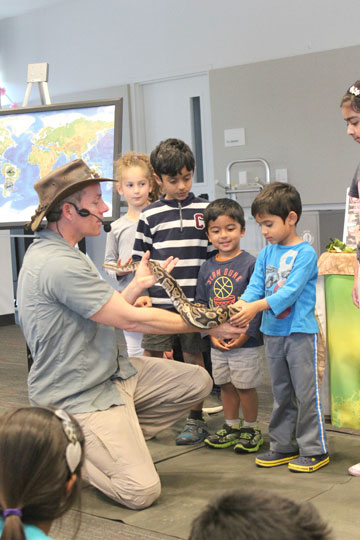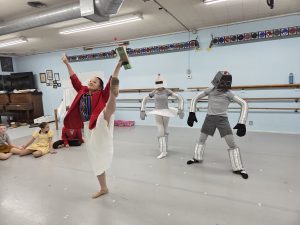

Children marveled at the bearded dragon, an Australian lizard with distinctive scales and spikes, cradled in Jungle James’s arms. They raised their hands and made pleading noises for a chance to stroke the lizard and the other reptiles Jungle James and his team brought to Northside Library’s April 2 Jungle James Animal Kingdom. About 145 people attended.
“We’ve learned this community loves animals,” says Cheryl Lee, branch manager and program coordinator. “They want to learn more about them, their ecosystems, how they live and what they eat.”
“We get to bring you face-to-face with these creatures so hopefully with a little bit of understanding and knowledge, they become less intimidating and less scary,” says Jungle James, who pledged to introduce reptiles all over the world in an hour. “Today we are going to focus on reptiles. Scales help keep their moisture in their body, and secondly, scales protect their body. Nature doesn’t make shoes for reptiles so nature gave them scales. Their body interacts so much with the earth. They crawl over rocks and twigs and all kinds of stuff and they don’t want to get cut up. What’s the other big characteristic [reptiles] all share in common? They’re cold-blooded.”
In addition to showing the bearded dragon, James and his assistant brought out a tegu (a big lizard) from Argentina, a cherry foot tortoise from the Amazon, a corn snake from the mid-western region of the United States, a ball python from East Africa and an enormous Burmese python from Southeast Asia. The Burmese python stretched over 10 feet and weighed 55 pounds. Children were eager to meet and touch all these animals.
James educated the audience about the animals and issued a friendly warning about why it’s dangerous to touch a snake’s face. He invited audience members to put themselves in a snake’s skin and imagine how uncomfortable they would feel if someone greeted them by grabbing their faces instead of shaking their hands. Because snakes don’t have hands, Jungle James suggested petting a snake’s body to replace a handshake.
“If a snake doesn’t have hands to defend itself, how does it defend itself? It might have to bite,” James says. “That’s the way nature gave him to defend himself. Let’s be honest. If someone grabbed my face, I might bite their finger too.”
“My favorite part was seeing the giant python because it was so big,” says Pritam, 5, after the presentation. “I got to touch a small python and a corn snake. They felt smooth.”
“This is a nice way for us to see and touch different animals that we wouldn’t ordinarily get to touch,” says Louise Mason, a mother who brought her three year-old son. “My son is learning about different textures. He just touched a tegu, which he has never done before.”












0 comments